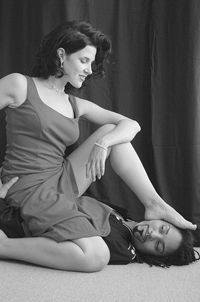Rebecca Patterson’s Queen’s Company turns out an all-female “Taming of the Shrew”
Director Rebecca Patterson was acutely aware of the problems in staging William Shakespeare’s comedy, “The Taming of the Shrew.” She loved the lightning-fast banter between shrewish Kate and her suitor Petruchio, and the wealth of physical comedy. But she was concerned about the heavy dose of misogyny the play serves up. In order for the story to be resolved, Kate’s fiery spirit must be tamed, her will subjugated to that of her husband. The story is a classic Bard comedy in which a beautiful, agreeable girl cannot be wed until her more independent older sister is married first. With some goading from the younger girl’s suitors, an enterprising gentleman from Verona is convinced to capture both the love and the significant dowry of the older daughter. Comic mayhem ensues.
Patterson, founding artistic director of The Queen’s Company, sought to acknowledge and defuse the misogynic elements without losing the comic aspects that make the play a classic. She has the players in her all-female troupe make some lighthearted moves that have heavy meaning. Patterson opens with her lead crossing the stage en mufti to tear up the speech a character in period dress reads about a woman’s proper place. Cyndi Lauper’s “Girls Just Wanna Have Fun” pumps through the speakers, and Kate, played by the talented and quite beautiful Carey Urban, sheds her street clothes and dons a long white frock.
Patterson explained that she wanted to “show my relationship to this play in a contemporary framing. Shakespeare is capturing a time when women were chattel. We as women in the contemporary world know that Kate is fabulous, but she is on the same ranking as women in the Muslim world are now. So the decision to have her enter the stage in street clothes is to make the audience step back and think about the play and its legacy, that some were slaves and some were masters.”
This same thinking led Patterson to make an inspired casting decision. For the role of Bianca, the lovely, subservient younger sister, Patterson knew no actor could compare to the stellar performance delivered by Little Sweetie, an anatomically correct, blonde-haired blow-up doll. In addition to the obvious comic relief this provides, it also operates on a political level. Like Todd Haynes did in his 1987 short “Superstar: The Karen Carpenter Story,” in which the characters are played by Barbie dolls, Patterson is exposing the fantasy that lies at the heart of the ideal of femininity. Patterson admitted that few of her players wanted to read for the part of Bianca, seeking to play more spirited roles. But she added, “Using a blow-up doll was the most effective way to show the tactics Bianca is using to be successful in the world, to be everything men expect of her. To me, that is a blow-up doll, a living, human Barbie doll.”
As the play proceeds, Kate, fresh from a spate of terrorizing the men of Padua, is introduced to the mercurial Petruchio (played by Samarra, who is indeed spirited). It is thrilling to follow the double-entendres and breakneck repartee between the two. The action is just as fast, with Petruchio tossing Kate around like she herself is a blow-up doll, and Kate responding with a dozen well-placed knees to the groin. The two are eventually wed, and Petruchio immediately takes Kate back to his home in Verona, where he intends to break her spirit to his will.
Again, Patterson handles what she calls “the torture scenes” in Petruchio’s house with aplomb. “Shakespeare didn’t write fluff,” said Patterson after the opening night performance. “His plays always captured the element of human truth in the situation. Kate is being broken… but whether you are gay or straight, whenever we are in a relationship we try to enforce our will; we want everyone to go our way. All he wants is for her to agree with him.” Still, the way Petruchio denies Kate food, sleep, and clothing all in the name of perfect love comes across as a Lifetime movie about domestic violence. Until Patterson cues up the Tina Turner song “I Don’t Wanna Fight,” which allows us to laugh at the very meta aspect of Patterson’s modern staging.
The resolution of the play finds Kate yielding to her husband’s will, agreeing to call the sun the moon if he wills it so. Yet in the final scenes, it is clear that although Kate is subservient to Petruchio, she still possesses the fiery spirit that makes her character so winning. Patterson manages to entertain and make a political statement about the sacrifices love demands.
“Everything is political to me,” said Patterson. “Life is political. And the fact is, I am queer. In our culture we bridge this weird abyss between queer and straight sexuality—we create false boundaries between sexuality…. But if you strip it down to its essence, it’s…sex: An absolute celebration of love, sexuality, what we find in the world. Ideally, good art always has a queer aesthetic.”
But exacting demands on her company also play their role.
“I have high standards,” the artistic director of The Queen’s Company said. “I’m a director who has a vision; I know what it takes to make a good play. I have a true commitment to make a fine piece of art, and it is what I was put on the planet to do. I’m good at it.”
gaycitynews.com
































